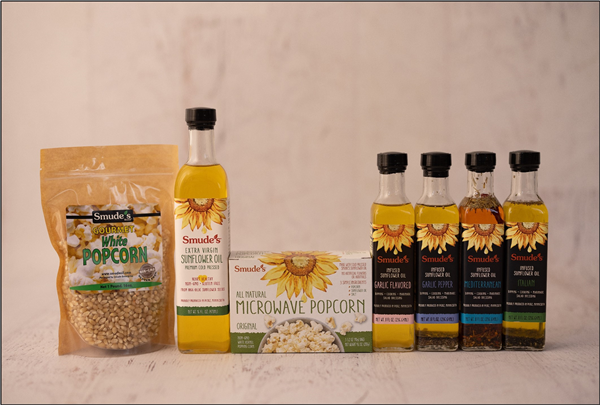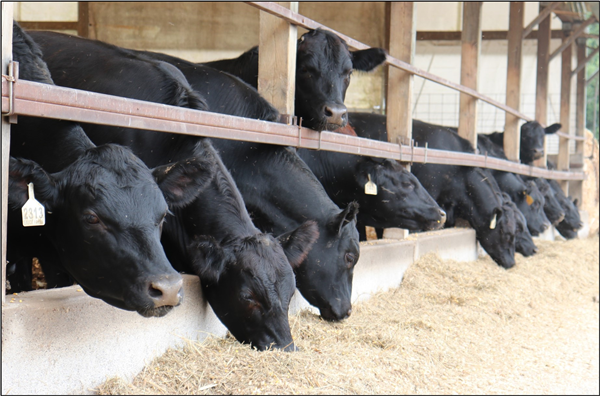By Michael Johnson
Editor’s Note: The following article appeared in a recent issue of Agweek, a publication of Forum Communications Company. Its author, Michael Johnson, is Agweek’s news editor. We appreciate Agweek’s permission to reprint it here.
Diversification is a key part of what has helped make the Smude family successful in central Minnesota and beyond.
The family has their hands in agriculture processing, cattle production, ag construction and sales, including eight different LLCs — taking up a good chunk of the Pierz industrial park and spilling into their nearby farm.
It’s diversification that led Tom Smude to add sunflower to his farm acres in 2009 in an effort to have a crop with better drought tolerance that he fed to his cattle herd that he’s been building since 2005.
The market for sunflower seed oil dried up shortly after the Smude family began pressing sunflower to extract the oils on their central Minnesota farm. But rather than giving up, Tom Smude knew he had to find another use.
His daughter, Katelyn Smude said that’s just the way her dad is.
“Dad’s not a quitter and he wanted to find a different way, basically,” she said.
The results have been paying off well for the family.

“We wanted to originally go into a bulk distribution, “ Katelyn said, of the oil that would have been destined for biofuel production. “But once the bulk distribution side of it kind of tanked and the market didn't do well, then we went into the retail of it.”
They continued cold pressing seeds on the farm and now do so at Midwest Processors in the Pierz Industrial Park. They use the sunflower meal as a high-fiber, high-protein diet for Smude’s Angus Farms and began processing small batches of specialty flavors of sunflower cooking oil sold at area farmers' markets in 2012.
Tom and his wife, Jenni, finish Black Angus cattle for market and also sell off the farm. The cattle are fed non-GMO crops like corn, sunflower and alfalfa. They have over 125 cow/calf pairs and about 150 steers on the feedlot. Beef remains an important part of the family focus.
Meanwhile, the wild idea of making specialty cooking oils out of the seed oil has now turned into a business with national sales across the upper Midwest and into East Coast supermarkets. The cooking oil, with flavors like garlic pepper and tomato basil, has caught on. And with the persistence in marketing their oil came even more rewards after a popcorn filling machine company reached out with the idea for the Smudes to make their own microwaveable popcorn.
Tom and Jenni started this sunflower venture in 2009 and continue to grow today. Their daughter, Katelyn, is the brand’s marketing manager.
“So it takes quite a while, but once we got started, we have quickly expanded into something that we are trying to make work and trying to keep growing and trying to expand to all different types of markets,” Katelyn Smude said at the Smude Sunflower Oil office in Pierz.
It’s at the Midwest Processors location just down the street that they accept the sunflower seeds and complete the entire oil extraction process through cold press equipment.
The factory runs 24 hours a day and seven days a week for roughly 45 weeks out of the year, according to operations manager Chad Warnke.
This plant has the ability to press about 8,000 to 10,000 gallons of oil a week, or around half a million gallons of oil per year. They mainly work with two types of seeds and oils. The high-oleic sunflower oil is used for cooking oils, for retail, whereas the mid-oleic oil is for more industrial purposes such as a fat in pet foods.
Much of the operations don't require constant attention, but there is constant monitoring. Any time something occurs that requires some attention, someone gets a text about the situation, such as a press malfunction.
While pressing has been continuing this year, a large addition at the plant has been under construction for much of the summer and fall, longer than anticipated. The project got a boost when it was awarded a $530,000 grant in 2024, but with the change of administrations, the USDA’s Resilient Food Infrastructure Systems Program funding was temporarily held back after the Smudes had already ordered much of the equipment.
The delay in getting the funding and getting the system installed has been costly, as they tore out a production line to make way for this new one. This production line will help them better mill, screen, store and integrate a packaging and production line. Other businesses like Seven Sundays, a Minneapolis food manufacturer that uses Smude’s sunflower flour to make cereals, have anxiously awaited the product to fulfill their contracts. This processing adds additional value to the sunflower and provides a gluten-free, chemical-free and allergen-free product for a market in need of more.
The Smude Sunflower Oil has found more markets still. Another local business, Barrett Petfood Innovations also takes bulk oil for their specialty dog food and pet treats.
 Photo Courtesy Smude’s Sunflower Oil
Photo Courtesy Smude’s Sunflower Oil
Benefits of Sunflower Oil
One thing the Smudes have been working to set straight are the health benefits of their products. Katelyn Smude has often had the conversation with consumers concerned that seed oils are unhealthy, an idea that’s gained ground since the new Health and Human Services Secretary Robert F. Kennedy, Jr., started sharing the opinion that seed oils, like soybeans, corn and sunflower, are toxic ingredients, causing chronic diseases and obesity.
“We keep all the healthy things into it, where they are getting rid of the good things,” Katelyn Smude said of the process of chemical refinement that sets them apart from some other processors.
She pushes back against the inclusion of sunflower oils among the list of harmful seed oils. She shared that their sunflower oil provides more vitamin E than any other vegetable oil. Vitamin E acts as an antioxidant. It’s also an important nutrient for vision, for fighting off diseases and for the health of blood, brain and skin, according to the Mayo Clinic.
Warnke said the sunflower oil gets labeled as bad with other seed oils, despite there being significant differences in the seeds and the oil extracted. There’s even a significant oil profile, flavor and color within the many types of sunflower seeds. The biggest issue is how the oil is refined, he said.
“So from day 1 we’ve only squeezed the seed, and after we’ve squeezed it, we filtered the oil and here it is, ready to go,” he said.
The type of sunflower they work with is high oleic, which is high in monounsaturated acid and low in saturated fats. Sunflower also [is] non-GMO, as there are no approved genetically modified sunflowers in the U.S.
Another health consideration that the Smude brand mentions is their choice of processing, which involves a series of cold presses and filters. This process leaves behind a small amount of sediment, leaving the taste and smell of the seed through this unrefined process. This does not involve chemical extraction.
A different process, called refined oil, and one that may concern some consumers, is one that uses a solvent to extract the oil. This gets the most efficient extraction, but the process is also said to destroy healthy antioxidants. These refined oils are clear, odorless and nearly devoid of nutrients. For those cooking with the oil, a tasteless and odorless option is attractive, regardless of the diminished health benefits.
Smude’s brand has made a name as a heart-healthy oil. Katelyn said a large hospital system’s heart health unit in St. Cloud, Minn., even gives out their product to those who need to improve their heart health.
They currently have nine flavor-infused cooking oils; several of the flavors have come to them thanks to customer feedback.
Smudes is in the process of adding a refined oil to its lineup due to demand. It’s a product that is easier to cook with, as it does not add some of the flavor and odor that you would get from the unrefined version; however, the company says it’s produced without the use of some of the more controversial forms of chemical extraction.
“As soon as they are ready to turn the switch on, we have a refined line ready to turn on that is only going to refine oil using heat, steam, water and citric acid,” Warnke said.
“It’s still healthy for you," Katelyn Smude said. “We didn’t do all the chemicals of the normal refined line would do. We still believe in our product, we still want you to try our product.”
This new line is not meant to take away from what they are already doing, but it will add more depth to an already strongly diversified product and diversified business structure.
Their innovations in processing have brought them such accolades as the Agricultural Utilization and Research Institutes Ag Innovator of the Year in 2018 and the Minnesota Manufacturing Awards Best New Product award in 2017.
Smudes contract about 20% of the acres of sunflower currently, but have a goal of contracting 100% of those acres. Most of the 9,000 acres they pull from are coming from North Dakota and South Dakota, the top sunflower-producing states in the country.
 The Smudes use sun meal as a high-fiber, high-protein diet for their Angus cattle.
The Smudes use sun meal as a high-fiber, high-protein diet for their Angus cattle.